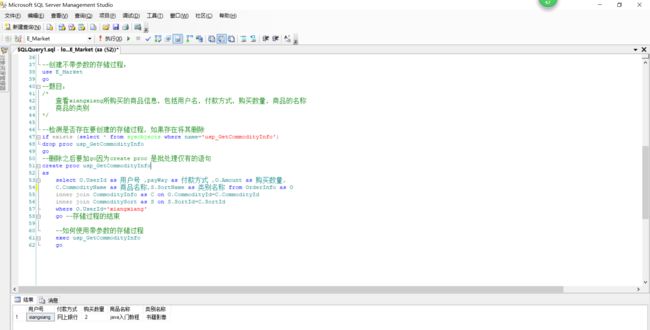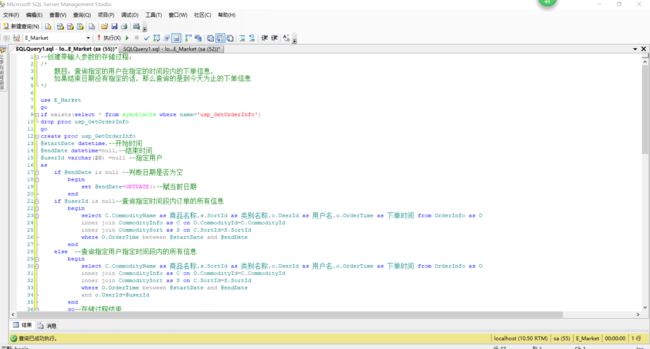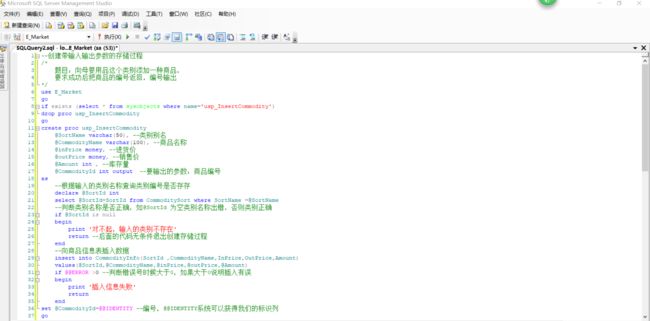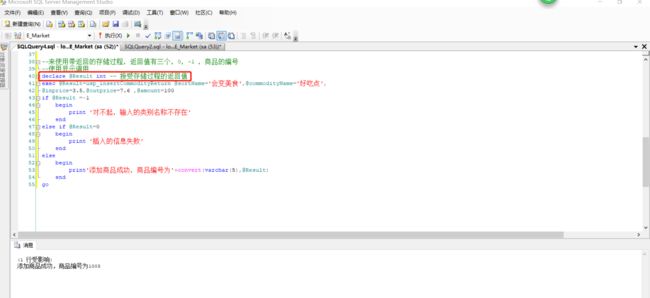SQLserver学习之存储过程
存储过程定义:
1.就是预先编译sql语句的集合
2.可以代替传统的逐条执行SQL语句的方式
3.可包含查询,插入,删除,更细等操作的一系列SQL语句
4.存储在sql server中
5.通过名称和参数执行
6.可带参数,也可返回结果
7.可包含数据操纵语句,变量,逻辑控制语句
存储过程的优点:
执行速度更快:因为存储过程在创建时就被编译,每次执行都不需要编译,而SQL语句的每一次执行都需要编译
允许模块化程序设计:存储过程一旦被创建,以后即可在程序中调用任意多次,这可以改进应用程序的可维护性,并允许应用程序统一访问数据库提高系统的安全性:存储过程在数据库中,用户只需提交存储过程名称就可以直接执行,避免了攻击者非法截取SQL代码获得用户数据的可能性
减少网络流通性:一个需要几百SQL语句代码的操作可以通过一条执行过的程序代码来执行,而不需要在网络中发送百行代码
重要的优点是:安全,执行速度快
存储过程的分类:
系统存储过程:用来管理SQLserver和显示有关数据库和用户信息的存储过程,sp_开头,存放在master的数据库中
扩展存储过程:使用其他编程语言创建外部存储过程,
并将这个存储过程在SQLserver作为存储过程来使用,xp_开头
自定义存储过程:用户在SQLserver中通过采用SQL语句
创建存储过程,通常以usp_开头(用的比较多)

存储过程的创建与调用:
不带参数的存储过程的创建与调用:
--常用的系统存储过程
use master
go
execute sp_databases
exec sp_renamedb @dbname='Demo',@newname='myDemo'
exec sp_renamedb 'myDemo','Demo'
--查看Post表中的所有信息
use Demo
go
exec sp_help Post
--常用的扩展存储过程:
use master
go
exec sp_configure 'show advanced option',1 --能够启动xp_cmdshell高级配置
go
reconfigure
go
exec sp_configure 'xp_cmdshell',1 --打开xp_cmdshell,可以调用SQLserver之外的系统命令
--使用xp_cmdshell 在D盘创建myFile的文件夹
exec xp_cmdshell 'mkdir d:\myFile',no_output --[no_output]是否输出返回信息
go
--如果SQLserver版本高的话,执行xp_cmdshell这个扩展存储过程的时候会报以下的错误:
--SQL Server 阻止了对组件 'xp_cmdshell' 的 过程 'sys.xp_cmdshell' 的访问,
--因为此组件已作为此服务器安全配置的一部分而被关闭。
--系统管理员可以通过使用 sp_configure 启用 'xp_cmdshell'。
--有关启用 'xp_cmdshell' 的详细信息,请参阅 SQL Server 联机丛书中的 "外围应用配置器"。
--创建不带参数的存储过程:
use E_Market
go
--题目:
/*
查看xiangxiang所购买的商品信息,包括用户名,付款方式,购买数量,商品的名称
商品的类别
*/
--检测是否存在要创建的存储过程,如果存在将其删除
if exists (select * from sysobjects where name='usp_GetCommodityInfo')
drop proc usp_GetCommodityInfo
go
--删除之后要加go因为create proc 是批处理仅有的语句
create proc usp_GetCommodityInfo
as
select O.UserId as 用户号 ,payWay as 付款方式 ,O.Amount as 购买数量,
C.CommodityName as 商品名称,S.SortName as 类别名称 from OrderInfo as O
inner join CommodityInfo as C on O.CommodityId=C.CommodityId
inner join CommoditySort as S on S.SortId=C.SortId
where O.UserId='xiangxiang'
go --存储过程的结束
--如何使用不带参数的存储过程
exec usp_GetCommodityInfo
go带输入参数的存储过程的创建与调用:
--创建带输入参数的存储过程:
/*
题目:查询指定的用户在指定的时间段内的下单信息,
如果结束日期没有指定的话,那么查询的是到今天为止的下单信息
*/
use E_Market
go
if exists(select * from sysobjects where name='usp_GetOrderInfo')
drop proc usp_GetOrderInfo
go
create proc usp_GetOrderInfo
@startDate datetime,--开始时间
@endDate datetime=null,--结束时间
@userId varchar(20) =null --指定用户
as
if @endDate is null --判断日期是否为空
begin
set @endDate=GETDATE()--赋当前日期
end
if @userId is null--查询指定时间段内订单的所有信息
begin
select C.CommodityName as 商品名称,s.SortId as 类别名称,o.UserId as 用户名,o.OrderTime as 下单时间 from OrderInfo as O
inner join CommodityInfo as C on O.CommodityId=C.CommodityId
inner join CommoditySort as S on C.SortId=S.SortId
where O.OrderTime between @startDate and @endDate
end
else --查询指定用户指定时间段内的所有信息
begin
select C.CommodityName as 商品名称,s.SortId as 类别名称,o.UserId as 用户名,o.OrderTime as 下单时间 from OrderInfo as O
inner join CommodityInfo as C on O.CommodityId=C.CommodityId
inner join CommoditySort as S on C.SortId=S.SortId
where O.OrderTime between @startDate and @endDate
and o.UserId=@userId
end
go--存储过程结束
--如何调用带参数的存储过程
--1)结束日期与用户都使用默认值
--指定了开始时间,查询的是从开始时间到今天的所有订单信息
exec usp_GetOrderInfo '2018-05-02'
--2.结束日期不为空,从开始时间到结束时间的所有信息
--隐式调用,参数顺序必须与创建存储过程的参数顺序完全相同
exec usp_GetOrderInfo '2018-05-02','2018-05-10','xiangxiang'
--3.显示调用,对参数顺序无要求,但是如果有参数中一个写了@名称=值的形式,
--之后的参数都必须写成@名称=值,默认值可以使用default代替
exec usp_GetOrderInfo @UserId ='xiangxiang',@startDate='2018-05-02',
@endDate=default
--显示调用时的@userId,@startDate,@endDate是存储过程定义时的参数
--要和上面声明的参数相同
--4.可以通过声明变量来调用
declare @d1 datetime,@d2 datetime,@uid varchar(20)
set @d1='2018-05-02'
set @d2='2018-05-19'
set @uid='xiangxiang'
exec usp_GetOrderInfo @d1,@d2,@uid
--除了显示调用之外,要求参数位置必须与存储过程定义时的顺序相同带输出参数的存储过程的创建与调用:
--创建带输入输出参数的存储过程
/*
题目:向母婴用品这个类别添加一种商品,
要求成功后把商品的编号返回,编号输出
*/
use E_Market
go
if exists (select * from sysobjects where name='usp_InsertCommodity')
drop proc usp_InsertCommodity
go
create proc usp_InsertCommodity
@SortName varchar(50), --类别别名
@CommodityName varchar(100), --商品名称
@inPrice money, --进货价
@outPrice money, --销售价
@Amount int , --库存量
@CommodityId int output --要输出的参数:商品编号
as
--根据输入的类别名称查询类别编号是否存存
declare @SortId int
select @SortId=SortId from CommoditySort where SortName =@SortName
--判断类别名称是否正确,如@SortId 为空类别名称出错,否则类别正确
if @SortId is null
begin
print '对不起,输入的类别不存在'
return --后面的代码无条件退出创建存储过程
end
--向商品信息表插入数据
insert into CommodityInfo(SortId ,CommodityName,InPrice,OutPrice,Amount)
values(@SortId,@CommodityName,@inPrice,@outPrice,@Amount)
if @@ERROR >0 --判断错误号时候大于0,如果大于0说明插入有误
begin
print '插入信息失败'
return
end
set @CommodityId=@@IDENTITY --编号,@@IDENTITY系统可以获得我们的标识列
go
--使用带输入输出参数的存储过程
--1.声明变量来调用(隐式调用,要求参数定义的顺序于声明时的相同)
declare @sortName varchar(50),@commodityName varchar(100),
@inprice money,@outprice money,@amount int,@commodityId int
select @sortName='母婴用品',@commodityName='星飞帆1段',@inprice=200,
@outprice=245,@amount=1000
EXEC usp_InsertCommodity @sortName,@commodityName,@inprice,@outprice,@amount,@commodityId output
print '添加商品成功,商品编号为:'+convert(varchar(5),@commodityId) --因为商品编号是int类型的,所以需要强制类型转换
go
--检查插入的数据
select * from CommodityInfo 带返回值的存储过程的创建与调用:
use E_Market--创建带返回值的一个存储过程
go
/*
向母婴用品中添加一条商品信息
*/
use E_Market
go
if exists(select * from sysobjects where name='usp_insertCommodityReturn')
drop proc usp_insertCommodityReturn
go
create proc usp_insertCommodityReturn
@sortName varchar(50),
@commodityName varchar(100),
@inPrice money,
@outPrice money,
@amount int--@commodityId int output
as
declare @sortid int
select @sortid=SortId from CommoditySort where SortName=@sortName
--根据输入的名称查看类别编号是否存在
if @sortid is null
begin
return -1 --用-1代表类别名不正确
end
--向商品信息表添加一条商品信息
insert into CommodityInfo(SortId,CommodityName,InPrice,OutPrice,Amount)
values(@sortid,@commodityName,@inPrice,@outPrice,@amount)
if @@ERROR >0
begin
return 0 --用0来代表插入信息失败
end
else
begin
return @@IDENTITY
end
go
--来使用带返回的存储过程,返回值有三个,0,-1 ,商品的编号
--使用显示调用
declare @Result int -- 接受存储过程的返回值
exec @Result=usp_insertCommodityReturn @sortName='会变美食',@commodityName='好吃点',
@inprice=3.5,@outprice=7.6 ,@amount=100
if @Result =-1
begin
print '对不起,输入的类别名称不存在'
end
else if @Result=0
begin
print '插入的信息失败'
end
else
begin
print'添加商品成功,商品编号为'+convert(varchar(5),@Result)
end
go最后是介绍创建和调用存储过程的一些注意事项:
创建存储过程的注意事项:
1.有默认值的参数要写在最后
2.存储过程创建结束,必须加批处理的go 否则的话会造成递归调用
调用存储过程的注意事项:
1.不写参数名,必须与定义的时候的参数顺序相同
2.不按照顺序,必须写上参数名
3.如果有一个写为“@名称=值”的形式,那么后面的所有参数都要这样写
4.如果调用存储过程的批处理中的第一句话,也就是go
exec 存储过程名称go
存储过程名称





